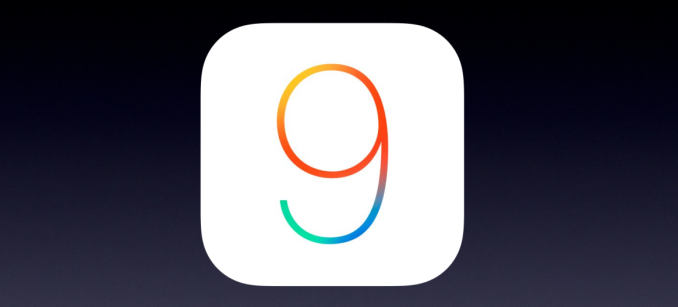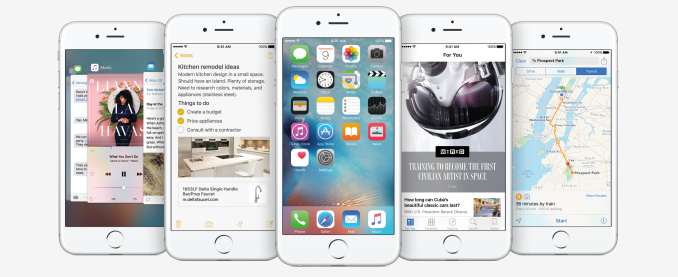The Apple iOS 9 Review
by Brandon Chester on September 16, 2015 8:00 AM EST- Posted in
- Smartphones
- Apple
- Mobile
- Tablets
- iOS 9

2015 has been a pretty big year for Apple as a company. Product launches this year included the Apple Watch, the iPhone 6s and 6s Plus, the iPad Mini 4, the iPad Pro, and the new Apple TV. This month is a big month for their software launches, with today marking the release of iOS 9 as well as watchOS 2, and OS X El Capitan launching at the very end of the month. In time I hope to do some sort of review of the new features in watchOS 2, but today's article focuses strictly on iOS 9 and everything new that Apple is bringing to their biggest operating system for both users and developers.
What's interesting about iOS 9 is how Apple has involved their community of users in the development process by creating a public beta program. OS X Yosemite famously was the first version of OS X to have a public beta (with the exception of the OS X 10.1 Kodiak beta 15 years ago), but Apple had never done anything like it for their mobile devices until now. However, many users found ways to install the developer betas of iOS on their devices by bypassing the activation or having a service register their UDID for beta installation. With more and more features being added to iOS, and more and more users adopting devices that run it, it appears that Apple felt that expanding their beta user base beyond developers would be a good way to collect information on bugs and stability, as well as general feedback about what does and doesn't work well.
Opening up iOS 9 with a public beta also plays into the focus of the new release. iOS 7 was an enormous release that redesigned the entire operating system, and iOS 8 added features like continuity and extensibility to improve how apps communicated on iOS, and how iOS devices and Macs communicate with each other. With all those changes there has been concern that there hasn't been enough attention to polish and eliminating bugs in iOS. While it's not something explicitly stated, it's clear that iOS 9 does go back to basics in some ways, and focuses on improving performance and stability. There are still new features, and some of them are very integral to keeping iOS competitive as a mobile platform, but the key focus is on solidifying the existing foundations.
The polish and improvements that will be most obvious to the end user are those that involve visual or functional changes to the apps they use on a daily basis. With that in mind, it makes most sense to start off the review by taking a look at some of the general changes made to the UI and the system in iOS 9, so let's dive in.











227 Comments
View All Comments
damianrobertjones - Thursday, September 17, 2015 - link
I was under the impression that Apple doesn't make chips.krutou - Thursday, September 17, 2015 - link
iOS is optimized for ARM architecture, and OS X isn't touch optimized. Rewriting iOS for x86 or integrating touch into OS X is a multi-year challenge.FunBunny2 - Sunday, September 20, 2015 - link
-- Rewriting iOS for x86 or integrating touch into OS X is a multi-year challenge.IOS and OSx are both BSD where it matters, and it's optimized for a good C compiler.
Sc0rp - Wednesday, September 30, 2015 - link
It's not that simple.dargonesti - Monday, March 7, 2016 - link
Loll, Apple? Innovation??"It's revolutionnary! It's 0.1 mm thinner and weights 5 grams lesss!" xD
Apple's only good at selling shiny things that costs a lot
Chaser - Wednesday, September 16, 2015 - link
Surface- "is a huge threat to iPad, because of it's versatility." Maybe in your open, technical view of things but most Apple users would never dream of changing ecosystems. They lose significant functionality doing so as they are comfortable with Apple and its applications such as Safari, iMessage, iTunes etc. Apple people want something that works for them in the most simplistic way, and that is consistent. Going Windows for them is a bottomless pit of turmoil to them. So compare TDP, nodes, whatever, the Apple faithful could care less.Joe_H - Wednesday, September 16, 2015 - link
"Maybe in your open, technical view of things but most Apple users would never dream of changing ecosystems. They lose significant functionality doing so as they are comfortable with Apple and its applications such as Safari, iMessage, iTunes etc."More BS from the clueless Apple faithful. Please explain to me how anyone would lose functionality going from a toy like the iPad to a full PC like the Surface? The Surface hardware not only has far greater functionality than the iPad, and Windows has far more functionality than iOS.
"Apple people want something that works for them in the most simplistic way, and that is consistent. Going Windows for them is a bottomless pit of turmoil to them. "
The Apple people are stupid sheep who can't think for themselves, and I hate to break it to you, but Apple consumers are a very small market compared to the overall PC and tablet market. Even in phones they are a small minority. So who gives a damn what they thing.
As for Windows being a bottomless pit of turmoil, spoken like an Apple shill who is so far up Apple's backside, he can't even see daylight. Windows 10 works simply and beautifully on a Surface Pro 3, and there is no turmoil to be found anywhere. So your argument is garbage.
solipsism - Wednesday, September 16, 2015 - link
Do you honestly expect anyone to take your comments seriously when you write stuff like "… a toy like the iPad to a full PC like the Surface"? You then include terms like "Apple faithful," "Apple shill," "so far up APple's backside," but call an actual, reasonable argument regarding pros and cons of utility as garbage. IF you had a point somewhere you completely lost it with excessive anti-Apple position that never even attempted to make an objective comment.Wolfpup - Wednesday, September 16, 2015 - link
There was no "reasoned argument", it was just a claim that somehow switching from iOS to Windows would "lose functionality". That's ludicrous. This so-called "reasoned argument" you mentioned even claimed people would rather use iOS Safari than be on Windows where you can run REAL Firefox, IE, Edge, Chrome... I don't care how faithful you may be to Apple, PLEASE tell me you'd rather use a full real web browser of your choice than mobile Safari! :-OHammerStrike - Wednesday, September 16, 2015 - link
The issue for me is that the notable feature on the Surface is the form factor, but the benefit of the form factor is ease of use, media consumption and mobility, and in all those area's the iPad is a superior device - it's lighter, has a much longer batter life and has hundreds of thousands of apps that are natively designed for a touch interface. The Surface is obviously the superior productivity device, but I just don't see anyone really cranking out spreadsheets, photoshop, etc on it in a mobile, touch form factor. At a minimum you probably want to be at a desk, if not docked into a full desktop environment - if that's the case there's no benefit to the form factor.For me, my iPad is my preferred device to check email, browse the web, read, play games, stream movies/music, etc. From the time I have spent with the Surface I can say that while I can do some of those things on it, it's not a preferred format to do it - works in a pinch, but would prefer other form factors. The navigation and usage of native iOS apps is superior to Win8/10 conterparts (when there are even direct comparables), plus its just a lot more comfortable device to hold for several hours.